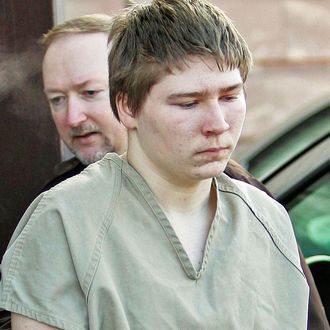
Making a MurdererÔÇÖs Brendan Dassey has been rejected by the Supreme Court. On Monday, they declined a plea to hear DasseyÔÇÖs appeal of his conviction for the 2007 murder of Teresa Halbach in Manitowoc County, Wisconsin, which was the subject of the Netflix true-crime series. In August 2016, a Milwaukee federal judge overturned DasseyÔÇÖs conviction, determining that the then 16-year-oldÔÇÖs controversial confession was coerced. However, an appeals panel ruled in December 2017 that DasseyÔÇÖs confession could be used against him; Dassey, now 28, was ordered to serve out the remainder of his life sentence in prison. The Supreme Court will not review that panelÔÇÖs decision, giving no reason for their rejection. DasseyÔÇÖs uncle, Steven Avery, who was also convicted for the murder, is still appealing his case. In 2016, Netflix renewed Making a Murderer for more episodes, pending further developments in the case.
Update: DasseyÔÇÖs lawyer has provided the following statement to Vulture in response to the Supreme CourtÔÇÖs decision:
ÔÇ£We will continue to fight to free Brendan Dassey. Brendan was a sixteen-year old with intellectual and social disabilities when he confessed to a crime he did not commit. The video of BrendanÔÇÖs interrogation shows a confused boy who was manipulated by experienced police officers into accepting their story of how the murder of Teresa Halbach happened.┬áThese officers repeatedly assured him that everything would be ÔÇÿokayÔÇÖ if he just told them what they wanted to hear and then fed him facts so that BrendanÔÇÖs ÔÇÿconfessionÔÇÖ fit their theory of the crime.┬áBy the end of the interrogation, Brendan was so confused that he actually thought he was going to return to school after confessing to murder.┬áNonetheless, he was convicted and sentenced to life in prison on the basis of this ÔÇÿconfession.ÔÇÖ
Unfortunately, Brendan isnÔÇÖt alone. Over the past twenty years, extensive empirical and psychological research has shown that children under 18 are between three and four times more likely to falsely confess than adults ÔÇô and yet the criminal justice system fails many of them.┬áItÔÇÖs up to the courts to put an end to this.┬áNow, more than ever, courts around the country must update their understandings of coercion in light of the newly understood problem of false confessions.┬áThe Center on Wrongful Convictions of Youth is dedicated to continuing this effort, along with our justice-minded partners in both law enforcement and defense-oriented communities across the globe.┬á┬á
We would like to extend sincere gratitude to the dozens of former prosecutors, national law enforcement trainers, leading psychological experts, innocence projects, juvenile justice organizations, and law professors who filed amicus briefs in this case and who, along with our legal team, will continue to fight for Brendan and the many other children who have been wrongfully convicted due to the use of coercive interrogation tactics.ÔÇØ


